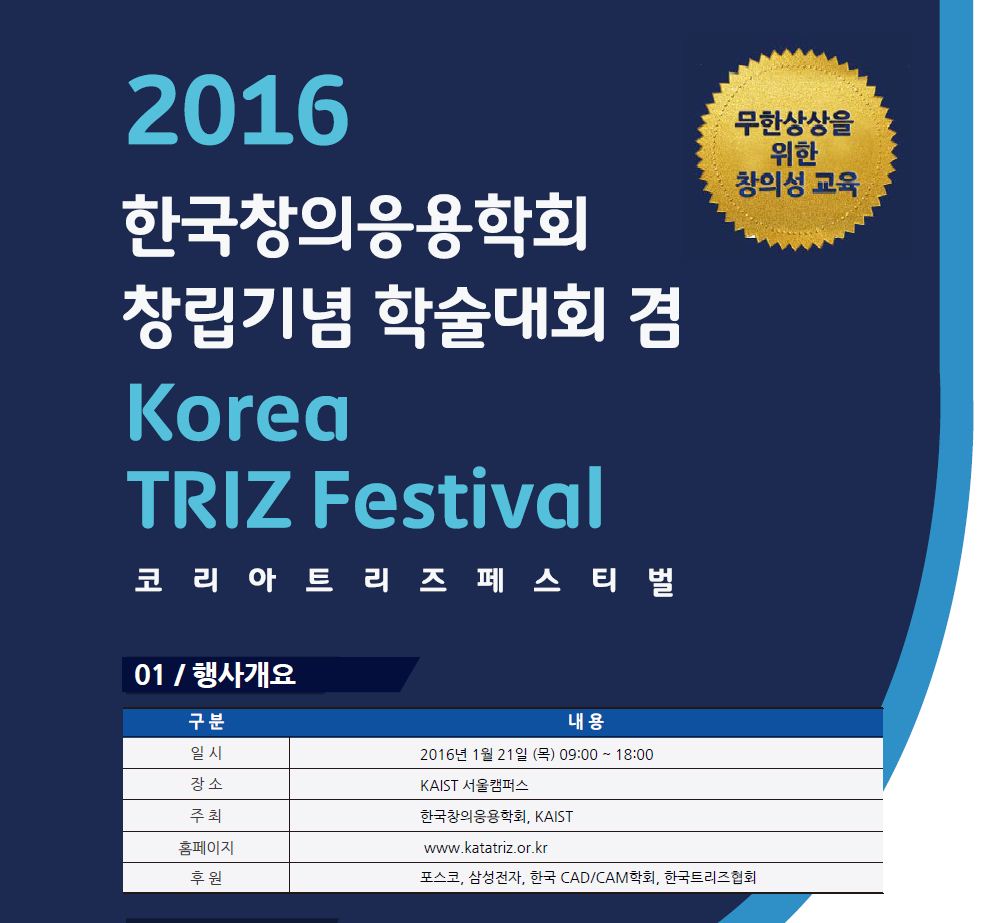event
KAIST and the Korea Society for Creativity and Application (KSCA) co-hosted a symposium on creative education on January 21, 2016 at the KAIST Business and Management College in Seoul. Along with the symposium, the two organizations also held the Korea "Theory of Inventive Problem Solving" (TRIZ) Festival 2016.
Around 200 experts from academia, industry, and research including Dong-Suk Kim, Dean of the KAIST College of Business and Management and Gui-Chan Park, Director of POSCO Group Academy, attended the symposium.
The event was organized to celebrate the foundation of KSCA and to increase social awareness of creative education and design-related thinking with a "TRIZ approach."
"TRIZ" stands for the “Theory of Inventive Problem Solving” in Russian. It is a problem-solving method based on logic and data, not intuition, which accelerates the project team’s ability to work out issues creatively. The "TRIZ approach" has been widely used among Korean companies including Samsung, LG, and POSCO as a means of boosting employees’ creativity.
The academic symposium was divided into a keynote speech, paper presentations from each field, and a poster fair.
Professor Dae-Sik Kim from KAIST delivered a keynote speech on “Neuroscience and Creativity,” offering a glimpse of the world from a neuroscience perspective. Jae-min Lee, a researcher at Samsung Electronics, provided an industrial case study, “Application of TRIZ for the Improvement of Refrigerator.” Professor Jung-Seok Hyun from Jeju University and Dr. Jung-Ho Shin from E-Triz System presented their application of TRIZ on “Limitless Imagination and Invention Class for the Elementary School Students.” Altogether, 36 other research papers and case studies were presented at the symposium.
Dr. Dong-ryul Yang, President of KSCA, said, “This academic symposium allows us to discuss a range of innovative case studies that utilize TRIZ in industrial and educational fields, from which we can learn good lessons and practices.”

-
event Virtual Commencement Ceremony Honors the Class of 2020
The KAIST community gathered online to celebrate the 2020 graduating class. The blended ceremony conferred their hard-earned degrees on August 28. The belated celebration, which was postponed from February 21 due to the COVID-19 outbreak, honored the 2846 graduates with live streaming on YouTube beginning at 2:00 pm. The graduates include 721 PhDs and 1399 master’s degree holders. The government raised its social distancing guidelines to level two out of three on August 23 as the sec
2020-08-28 -
people President Shin Shares Innovation Strategy at Moscow
President Sung-Chul Shin shared the recipe for success for rapid national development through university education during the Island 10-22 Conference held at the Skolov Institute of Science and Technology in Moscow on July 16. President Shin stressed how urgent it is for higher education to rapidly embrace the new global economic environment brought about by the Fourth Industrial Revolution in his keynote address entitled ‘Roles and Responsibilities of Universities for Rapid Nationa
2019-07-18 -
event Dr.Sung-Chul Shin Inaugurated as the 16th President of KAIST
(President Shin delivers his inaugural address at the inauguration ceremony on March 15.) Professor Sung-Chul Shin was officially inaugurated as its 16th president of KAIST on March 15 in a ceremony at the KAIST Auditorium. The celebration began with a procession by dignitaries including the KAIST Board of Trustees Chairman Jang-Moo Lee, the National Academy of Sciences of Korea President Sook-Il Kwun, Daejeon City Mayor Sun-Taik Kwon, National Assemblyman Sangmin Lee, KAIST Alumni Associa
2017-03-15 -
people Professor Keon-Jae Lee Lectures at IEDM and ISSCC Forums
Professor Keon-Jae Lee of KAIST’s Materials Science and Engineering Department delivered a speech at the 2015 Institute of Electrical and Electronics Engineers (IEEE) International Electron Devices Meeting (IEDM) held on December 7-9, 2015 in Washington, D.C. He will also present a speech at the 2016 International Solid-State Circuits Conference scheduled on January 31-February 4, 2016 in San Francisco, California. Both professional gatherings are considered the world’s mos
2015-11-26 -
people President Steve Kang of KAIST Receives the Outstanding Contribution Award from the Korean-American Scientists and Engineers Association
The Korean-American Scientists and Engineers Association (KSEA), a non-profit Korean professional organization based in the United States with over 6,000 registered members, bestowed upon President Steve Kang of KAIST the 2015 Outstanding Contribution Award. The award is presented to a person who has made significant contributions to the development of KSEA. The award ceremony took place during the 2015 US-Korea Conference on Science, Technology, and Entrepreneurship (UKC), which was
2015-08-05